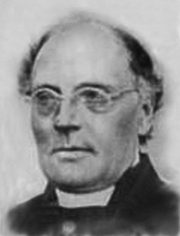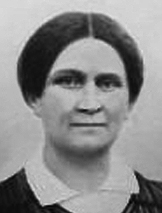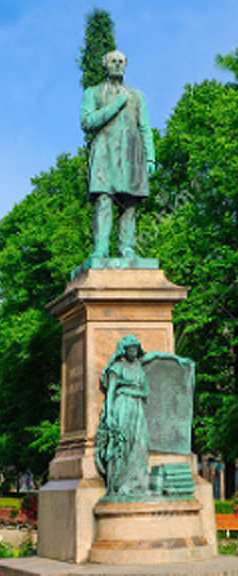Johan Ludvig Runeberg
by Joelle Steele
 Johan Ludvig Runeberg, the Finnish national poet, was born in Jakobstad, Finland on February 5, 1804. He was the son of a sea captain, Lorenz Ulrik Runeberg (01/17/1772-12/12/1828) of Allunda, Sweden, and Anna Maria Malm (02/07/1782-06/16/1834) of Jakobstad, Finland, the daughter of a merchant. Johan had a brother, Otto August Malm (1839-1898), who was once the wealthiest man in Finland.
Johan Ludvig Runeberg, the Finnish national poet, was born in Jakobstad, Finland on February 5, 1804. He was the son of a sea captain, Lorenz Ulrik Runeberg (01/17/1772-12/12/1828) of Allunda, Sweden, and Anna Maria Malm (02/07/1782-06/16/1834) of Jakobstad, Finland, the daughter of a merchant. Johan had a brother, Otto August Malm (1839-1898), who was once the wealthiest man in Finland.
Johan is the fourth cousin twice removed (4C2R) of my grandfather, Anders Joel Mattsson Sandkulla Stål Granö (Joel Steele), making him my 4C4R. Johan was the ½4C1R of my grandmother, Helny Maria Andersdotter Furu, making him also my ½4C3R.
In 1831, Johan married Fredrika Charlotta Tengstrom (09/02/1809-05/27/1879). They had eight children: Fredrik Karl, Anna Maria, Ludvig Mikael, Lorenzo, Walter Magnus, Johan Wilhelm, Jakob Robert, and Edvart Moritz Adolf.
As a child, Johan’s Swedish-Finn family was not well off financially. When he was eight years old, he was sent to live with an uncle in Oulu (Uleåborg). He went to school there, studying first at Vasa Grammar School, where he became interested in the Swedish poets, and afterwards at the University of Åbo (Turku), beginning in the fall of 1822. When he was in his late teens or early twenties, he met and became friends with two men who would later become famous for their historic novels: J.L. Snellman and Zachris Topelius, who later was a lodger in the Runeberg home in Borgå. In 1823, Johan worked as a personal tutor in Saarijärvi and Ruovesi. It was there that he first encountered the Finnish-speaking people and heard tales of the Russian-Swedish war of 1808-09 that led to a separation of Finland from Sweden and an annexation of Finland to Russia as a Grand Duchy. He became fascinated with the rural population, classic literature, and other influences that formed the basis for his patriotic ideals. When he returned to Åbo, he began sending his poetry to local papers.
Johan received his degree in philosophy in 1827 from the university, which had been relocated to Helsingfors following a fire. Three years later, in 1830, he became a lecturer in rhetoric, at which time his first volume of verse, Poems, was published. That same year, a collection of Serbian folk songs he had translated into Swedish was also published. The year 1831 was a landmark for Johan. His romantic piece, The Grave in Perho, won a gold medal from the Swedish Academy, he was appointed university lecturer in Roman literature.
 Fredrika Tengstrom
Fredrika Tengstrom
That same year, while secretly engaged to Maria Juliana Nygren, he married his second cousin, Fredrika Tengstrom. The following year, Elgskyttarne (The Elk Hunters), one of his best-known works, was published. That same year, he founded an influential literary paper, the Morgonblad (Morning Paper), which he wrote with his wife, Fredrika, and in which many of his own pieces were published. These accomplishments were followed a year later by another poetry collection. In 1834, his comedy, Friaren fran Landet (The Country Lover), did not garner much success, but two years later, his poetic idyll of country life did. Two years later, in 1873, Johan became the Latin chair at Borgå College, and remained in that town for the remainder of his life. In 1838, he founded the Borgå Tidning(the Borgå News) and became its editor. The following year, Johan won the Swedish Academy’s highest award for poetry.
Johan was now a well-recognized poetic force among Swedish poets. From 1841 to1844, more of his works were published, and in 1848, he achieved his greatest popularity with a series of poems on the war of 1808/09, Fänrik Stål Sägner (The Tales of Ensign Stål or Ensign Steel’s Stories). In 1860, a second volume was published. From 1847 to 1850, Johan was the rector at Borgå College. He resigned from that post in 1851 in order to visit Sweden – the only time he ever left Finland. The following year, he and Fredrika moved into a new home, which has been maintained as a museum in his honor since 1882.
 Runeberg statue in Helsinki.
Runeberg statue in Helsinki.
During the 1850s, Johan wrote several hymns. In 1854, he produced a volume of his essays, Smarre Berättelser (Shorter Stories), and became the president of a committee for the creation of a national Psalter, a psalm book for public use. An attempt at comedy, Kan ef (Can’t), fizzled in 1862, but the following year he had considerable success with the dramatic Kungarne pa Salamis (The Kings at Salamis).
While on a hunting expedition in 1863, Johan suffered a stroke and was unable to write again. His wife stayed by his bedside and read to him daily until he died May 6, 1877, and the entire nation mourned the passing of Finland’s National Poet.
Johan’s son Walter was a sculptor. He created a statue of his father which was unveiled on May 6,1885, eight years after Johan died. It stands in Esplanade Park in Helsingfors. Johan’s wife, Fredrika, was also a talented artist and writer. While studying at the University in Åbo, she supported herself by selling her own paintings. In 1858, her novel, Fru Catharina Boije och hennes Döttrar (Lady Catharina Boije and her Daughters), was a critically acclaimed historic piece. She wrote a second novel, but after receiving a poor review from J.L. Snellman, she wrote no further novels, but contributed to a variety of magazines.
Johan is especially well-known for the poem, Vårt Land (in Swedish) or Maamme (in Finnish) and Our Land (in English). It was from the prologue to the first verse in The Tales of Ensign Stål, and became the lyrics for the (unofficial) Finnish national anthem, It was performed for the first time in 1848 on Flora Day. A line from one of the poems in The Tales of Ensign Stål also became a slogan against the Russians: “Let not one devil cross the bridge.” Several of Johan’s poems were set to music, and his birthday is celebrated in Finland as “Runeberg Day.” In Finland, the Runeberg prize has been awarded for literature since 1986.
The Order of Runeberg Society was organized by Swede-Finns in Illinois in 1920 to unite Swede-Finns, and people of that origin, "to promote education and temperance work, to collect funds for sickness and funeral benefits for members, and in general to promote helpfulness and brotherhood among their countrymen."

